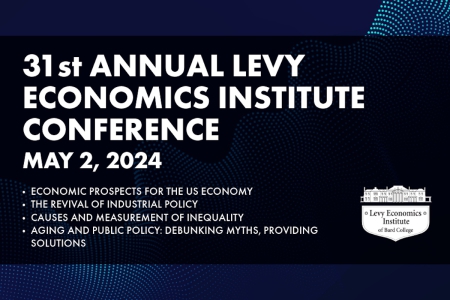Filter by
3536 results found
-
Working Paper No. 1048
An Empirical Analysis of Swedish Government Bond Yields
April 19, 2024 This paper econometrically models the dynamics of Swedish government bond (SGB) yields. It examines whether the short-term interest rate has a decisive influence on long-term SGB yields, after controlling for...more Publication -

Galbraith for INET: “Industrial Policy Is a Good Idea, but So Far We Don’t Have One”
April 19, 2024 In a remarkable and comprehensive book, forthcoming from Cambridge, Marc Fasteau and Ian Fletcher provide a theoretical, historical, and up-to-date review of industrial policies, in the United States and elsewhere, as well as a decent summary of the main Biden initiatives. News -
Working Paper No. 1047
“Just Transition” in India and Fiscal Stance: Analyzing the Tax Buoyancy of the Extractive Sector
April 08, 2024 Against the backdrop of fiscal transition concomitant to energy transition policies with climate change commitments, revenue from the extractive sector needs a recalibration in the subnational fiscal space. Extractive tax...more Publication -

High school students across the US have been studying and citing the work of Research Scholar Pavlina Tcherneva to argue affirmatively for the job guarantee in preparation for the ’24 national debate tournaments.
April 03, 2024 Thousands of high school students across the United States have been studying the work of Bard Professor of Economics and Research Scholar of the Levy Economics Institute Pavlina Tcherneva in preparation for their national debate tournaments. News -
Research Project Report
Integrating Nonmarket Consumption into the Bureau of Labor Statistics Consumer Expenditure Survey
March 19, 2024 In spring 2021, under the direction and encouragement of Commissioner William Beach, the US Bureau of Labor Statistics (BLS) kicked off a major initiative—to produce a measure of consumption to...more Publication -
 Policy Note No. 2024/4
Policy Note No. 2024/4European Job Guarantee
March 14, 2024 Despite the gradual economic recovery and positive policy responses during the COVID-19 pandemic, the problem of long-term unemployment continues to plague millions in Europe. To effectively address this and other...more Publication -
Working Paper No. 1046
The Aggregate Production Function and Solow’s “Three Denials”
March 07, 2024 This paper offers a retrospective view of the key pillar of Solow’s neoclassical growth model, namely the aggregate production function. We review how this tool came to life and how...more Publication -
Working Paper No. 1045
Social Security and Gender Inequality
March 07, 2024 This inquiry examines the role of federal policy in gender inequality using the principles of institutional adjustment (Foster 1981; Bush 1987) in the context of the Veblenian dichotomy of habit...more Publication -
 Blog
BlogWhatever It Takes: How Neoliberalism Hijacked the Public Purse
March 01, 2024 Originally appeared on Levy-affiliated project, the Economic Democracy Initiative. The spectacular government spending post-2008 and post-2020 appeared to upend the neoliberal logic of the past decades, enabling bold public action and opening the door to a more just and democratic social order. Specific policy choices stamped out this opportunity. These pivotal moments did, however, point [...] Blog -
 Blog
BlogHow the Taxpayer Myth Gives Life to the Neoliberal Agenda
March 01, 2024 The taxpayer narrative is pervasive. It is present in the budgeting process, in the framing of government policies and in daily political life. Issues and debates about the public purpose are all cast in terms of the financials. The first thing asked about a proposed spending policy is “how are we going to pay for [...] Blog -
Working Paper No. 1044
Empirical Models of Chinese Government Bond Yields
February 23, 2024 This paper econometrically models the dynamics of long-term Chinese government bond (CGB) yields based on key macroeconomic and financial variables. It deploys autoregressive distributive lag (ARDL) models to examine whether...more Publication -
 Strategic Analysis
Strategic AnalysisGreece: Time to Reduce the Dependency on Imports
February 15, 2024 In this report, Dimitri B. Papadimitriou, Nikolaos Rodousakis, Giuliano T. Yajima, and Gennaro Zezza investigate the determinants of the recent performance of the Greek economy. Despite geopolitical instability from the...more Publication -
Working Paper No. 1043
Interest Rate Dynamics: An Examination of Mainstream and Keynesian Empirical Studies
February 14, 2024 This paper critically reviews both mainstream and Keynesian empirical studies of interest rate dynamics. It assesses the key findings of a selected number of these studies, surveying the debates between...more Publication -
Working Paper No. 1042
Saving Social Security
February 13, 2024 For more than 25 years, the Social Security Trust Fund was projected to run out of money in 2033 (give or take a few years), potentially causing benefits to be...more Publication -
The Disconnect Between Biden’s Great Economic Numbers and How Voters Feel about the Economy
February 06, 2024 Listen to Levy Scholar Pavlina Tcherneva on Back Ground Briefing with Ian Masters. Available on SoundCloud now. News -

Read Senior Scholar James K. Galbraith’s article, “Entropy, the Theory of Value and the Future of Humanity” featured by the Economic Democracy Initiative.
February 05, 2024 In a keynote address to a conference on “Geopolitical Changes” at Kozminski University, Warsaw, on January 29, 2024, Professor James Galbraith called for economics to break with equilibrium dogma and re-found itself on the life principles that govern physics, biology and every existing mechanical and social system. News -
Working Paper No. 1040
COP28 and Environmental Federalism: Empirical Evidence from an Emerging Economy, India
February 02, 2024 Against the backdrop of COP28, this paper investigates the impact of intergovernmental fiscal transfers (IGFT) on climate change commitments in India. Within the analytical framework of environmental federalism, we tested...more Publication -
Working Paper No. 1039
Can the Philippines Attain 6.5-8 Percent Growth During 2023–28?
February 02, 2024 We expand the standard balance-of-payments–constrained (BOPC) growth rate model in three directions. First, we take into account the separate contributions of exports in goods, exports in services, overseas remittances, and...more Publication -
Working Paper No. 1041
Amazon Green Recovery and Labor Market in Brazil
February 02, 2024 Announced in June 2021, the never-implemented Green Recovery Plan for the Brazilian Legal Amazon Region (GRP) would be a green transition initiative to be carried out by the state governments...more Publication -
Working Paper No. 1038
Economic Possibilities for Our Grandchildren—90 Years Later
January 29, 2024 This paper revisits Keynes’s (1930) essay titled “The economic possibilities for our grandchildren.” We discuss the three broader trends identified by Keynes that he expected would come to characterize the...more Publication -
Working Paper No. 1037
Markups, Profit Shares, and Cost-Push-Profit-Led Inflation
January 10, 2024 The post-pandemic surge in inflation was accompanied by a surge in the corporate share of profits. As a result, several economists and policy makers have given to it names such...more Publication -
Working Paper No. 1036
The Estimation of Production Functions with Monetary Values
January 05, 2024 For decades, the literature on the estimation of production functions has focused on the elimination of endogeneity biases through different estimation procedures to obtain the correct factor elasticities and other...more Publication -
Working Paper No. 1035
The Swedish Monetary System from a Balance Sheet Perspective
January 04, 2024 In this paper, we discuss the balance sheet mechanics of the Swedish government. We examine spending, government bond purchases, and tax payments. As long as the Swedish central bank, which...more Publication -
 Event
Event31st Annual Levy Economics Institute Conference
The 31st Annual Levy Economics Institute Conference was a one-day, virtual event organized around the topics of Economic Prospects for the US Economy, The Revival of Industrial Policy, Causes and Measurement of Inequality, and Aging and Public Policy: Debunking Myths, Providing Solutions. Event


